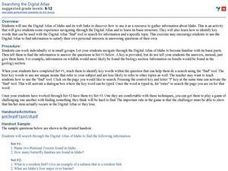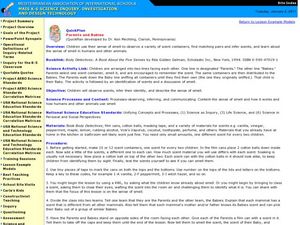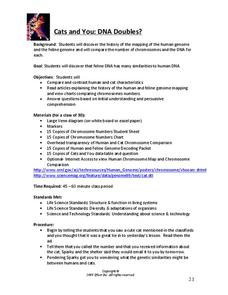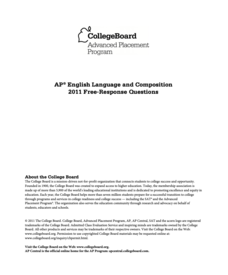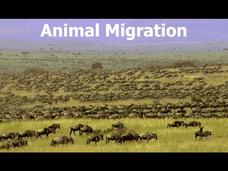Curated OER
Sound for Sight
Learners study echolocation and understand how dolphins use it to locate prey, escape predators, and navigate their environment. They view a video, "In the Wild-Dolphins with Robin Williams" and see first hand how dolphins communicate. ...
Curated OER
All About Bats
Second graders research everything they know about bats. They find out anything about bats that was not discovered by the class and to come back and share the new information. They color their own picture of a bat and will write at least...
Texas Instruments
Can You Breathe Like a Pinniped?
Young learners compare the breathing patterns of different animals in this pinniped lesson. They examine the breathing pattern of California sea lions and northern elephant seals. Pupils collect, compare and analyze data concerning...
Curated OER
Plants and Animals
Students find common needs between plants and animals. In this plants and animals lesson students compare that both plants and animals need food and water. They also find the differences between plant and animal needs.
Curated OER
Life Has A History
In this biology learning exercise, students identify and match various classes of species found today. Then they explain why biodiversity exists today on earth and define evolution. Students also describe who a paleontologist is and what...
Curated OER
Steller Sea Lions
In this Steller sea lions worksheet, students read information and do activities on four pages. Students put life cycle events in chronological order.
Curated OER
Discover the Similarities: Marine Mammal Rescue
Young scholars analyze the the similarities of their own daily schedule, processes and procedures and those used at work. They research the career of marine mammal rescue and email questions to a career expert. They construct a display...
Curated OER
Searching the Digital Atlas
High schoolers become familiar with the tools of a digital atlas. They use a digital atlas of Idaho to located specified information. Students identify national forests, locate butterfly families, find examples of resident fish, and...
Curated OER
Animal Classification
In this animal classification worksheet, students will complete a graphic organizer by writing in the different animal groups: birds, mammals, reptiles, birds, and amphibians.
Curated OER
Parents and Babies
Students examine different scents. In this science lesson, students are divided into being parents or babies and are each given a scent. The "parents" have to identify or infer the scent of their "baby" showing that every mammal has a...
Curated OER
Mammals and Reptiles
Students are read books about the different characteristics of mammals and reptiles. They then draw pictures of mammals, write down the animals' name and staple the pictures together to make a booklet and list their characteristics on...
Beyond Benign
Cats and You: DNA Doubles?
What do cats and human DNA have in common? The second lesson of a series focuses on the mapping of mammal genomes. Scholars learn about the structure of DNA as they compare the chromosomes of humans and felines.
School Science
The Big Bang Time Machine
Scholars take off on an interactive spaceship to explore a historical timeline of the big bang theory. They learn about the evolution of mammals and humans, the formation of stars and planets, and the chemical composition of the early...
American Museum of Natural History
What's This? Feeding
Some species have pretty creative methods for catching food. Young scientists learn about some interesting ways organisms get the nutrients they need by navigating an online interactive lesson that would be suitable for a remote learning...
College Board
2011 AP® English Language and Composition Free-Response Questions
Mammals can be carnivores, omnivores, and herbivores, but what about locavores? A set of free-response questions from the 2011 AP® English Language and Composition exam introduces test-takers to the term, which describes people who try...
Purdue University
The Great Clearcut Controversy
Urban development and habitat retention are often at odds. A three-part lesson examines the pros and cons of forest clearcutting. Learners review data and characteristics of a specific mammal to make conclusions about the effect...
Curated OER
Who Am I?
Young biologists can see a variety of animals, amphibians, mammals, insects and clearly identify them. They match up the animals' names with the picture. The pictures are clear and colorful! A very nice worksheet for early elementary...
Curated OER
Structures That Reveal Common Ancestry
Float like a butterfly, sting like a bee, check out wing shapes for common ancestry! Beginning biologists compare wings as analogous structures and discover that environment influences evolution of adaptations. A third activity relies on...
Curated OER
Animals and Humans
Young scholars identify the functions of various body parts. They participate in the "Head, Shoulders, Knees, and Toes" song, draw a picture of themselves and other mammals, and create a traced outline of their body that they add...
University of Washington
Animal Migration
Here is a unique resource to use with middle and high schoolers that deals with animal migration. Viewers discover the reasons for, types of, and animals that practice this behavioral adaptation. Specific animals that are introduced...
Sea World
Seals, Sea Lions, and Walruses
Learn about the mammals of the sea with a lesson about seals, sea lions, and walruses. Kids study the characteristics of each pinniped with flash cards and information, and then analyze data about elephant seals, measure heat loss...
National Park Service
Hibernation-Migration-Fascination
What's the difference between hibernation and a good nap? Find out with an engaging life science activity that compares the hibernation habits of grizzly bears and marmots. After learners read an informational passage about each mammal,...
Curated OER
Animals Belong in Class
In this classifying animals worksheet, students use the information in the word bank to complete the T-Chart about mammals, birds, fish, reptiles, amphibians, and arthropods. Students write 10 answers.
Curated OER
Choose the Homograph
Practice homographs with this fun activity! Learners choose the meanings of ten homographs based on the sentence's context clues. The activity has a picture of bats - one flying mammal, and one used in baseball. Use this resource as a...
Other popular searches
- Ocean Mammals
- Characteristics of Mammals
- Marine Mammals
- Mammals and Fish
- Animals Mammals
- Human/mammal Life Cycle
- Land Mammals
- Mammals (Wildlife)
- Prehistoric Mammals
- Mammal Characteristics
- Mammals Word Search
- Mammals Crossword







